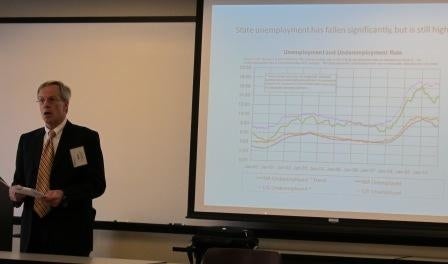Economist: 2011 Is Transition Year To Stronger Economy
 PHOTO/BRANDON BUTLER
Economist Alan Clayton-Matthews, addresses a gathering of the Massachusetts Alliance for Economic Development (MassEcon) at Clark University in Southborough.
PHOTO/BRANDON BUTLER
Economist Alan Clayton-Matthews, addresses a gathering of the Massachusetts Alliance for Economic Development (MassEcon) at Clark University in Southborough.
2011 will be the year that the Massachusetts economy transitions back to healthy, but not overly robust growth levels, and 2012 will see even stronger growth, predicts Northeastern University economist Alan Clayton-Matthews.
Clayton-Matthews presented his economic forecast at the Clark University Graduate Center in Southborough to a meeting of the Massachusetts Alliance for Economic Development (MassEcon), which is a statewide nonprofit business advocacy group.
"We had a terrible dot-com recession in 2001 to 2003, and we were just beginning to get to a nice robust growth path when another recession hit," Clayton-Matthews said. "It appears we're just beginning to get back to that robust growth path and it looks like we're on our way to that. But it hasn't been a smooth transition."
After rapid growth in early 2010, it slowed at the end of the year. This year, the Massachusetts economy will grow at a steady rate of about 3 percent, Clayton-Matthews predicted. That will just about mirror national economic growth, but the national economy may grow even faster.
Recently the state's economy has been outpaced by national economic gains, but Clayton-Matthews said he predicts that is merely a "pause" in the state's trajectory.
2012 will see even more robust growth, he said, which will then level off in 2013 and 2014.
The recession from about May 2008 to August 2009 was not as severe in Massachusetts compared to the rest of the nation, as is evidenced by the state's unemployment rate not dropping as severely as it did nationwide, Clayton-Matthews said.
Plus the recession nationwide, at 15 months, was neither as long nor as severe as recession of the late 1980s into the early 1990s, which lasted for 31 months.
Coming out of the recession, as consumer demand continues to increase, businesses will continue to hire. And because businesses have already increased productivity at high rates, for businesses to increase output, Clayton-Matthews expects them to hire.
The technology market specifically should be primed for growth in the future, Clayton-Matthews said. That sector has experienced a "V" shaped recession with technology products seeing demand levels similar to that of before the recession.
As for the housing market, Massachusetts home prices generally fared better in the recession compared to nation as a whole, but they have begun to level off recently.
Meanwhile, construction permits for new housing are a third of what they were before the recession.
"Those numbers will not come back until the sales figures do," he said.








0 Comments